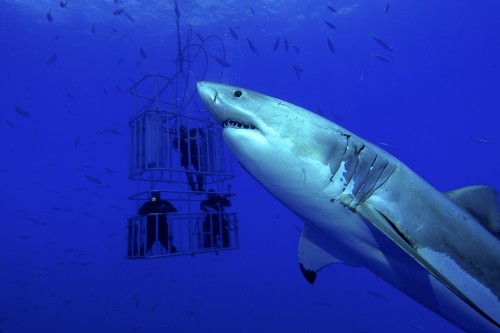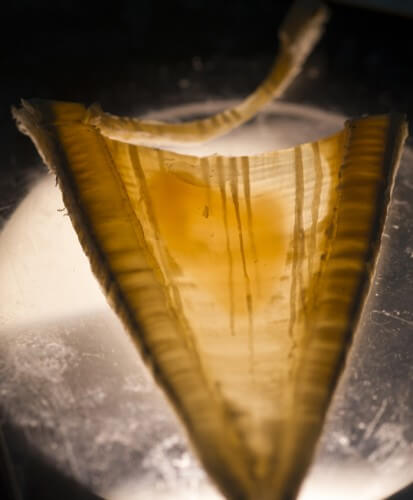This is the first successful result of radiocarbon in adult white sharks. The study included the analysis of the bodies of four females and four males from the northwest Atlantic Ocean. The age of the largest male was 73 years and that of the largest female 40 years.

Great white sharks - the largest predators in the oceans grow much more slowly and live longer than previously thought. This is according to a study led by the Woods Hole Oceanographic Institution (WHOI).
This is the first successful result of radiocarbon in adult white sharks. The study included the analysis of the bodies of four females and four males from the northwest Atlantic Ocean. The age of the largest male was 73 years and that of the largest female 40 years.
Our results sharply increase the maximum age and lifespan of great white sharks compared to previous studies," says Lee Ling Hammadi, a joint student at MIT and WHOI and the principal investigator of the study published in PLOS ONE. "Understanding the life span of an animal species, growth rate, age of sexual maturity and differences in growth between males and females is particularly important for sustainable management and conservation efforts."
Determining the age of fish is mainly carried out through the analysis of growth segments in mineral tissues such as the ear bone, the vertebrae or the tips of the fins. These organs grow throughout the life of the fish and add annual rings similar to the growth rings of trees. While the vertebrae are made up of layers of tissue, which are added throughout the life of the fish, the patterns of alternating light and dark bands can be thinner than in other species and the bands do not necessarily indicate annual growth."
"Traditionally, estimating the age of sharks has relied on these pairs being added each year. In many cases this turned out to be untrue throughout the shark's life." says Lisa Nathanson, NOAA marine biologist and research partner.
In previous studies in which these stripes were examined in the vertebrae of sharks, it was found that sharks identified in the Pacific Ocean were on average 22 years old and those in the Indian Ocean were 23 years old.
For the purpose of the research, the scientists used the radioactive carbon created in nuclear experiments during the fifties and sixties. Atmospheric radioactive carbon mixed with the oceans during those times. The increase in the amount of carbon measured in ∆14C provided the researchers with a specific point in time embedded in the vertebral layers, which could be used as a time stamp to help determine the animal's age.

Using the mass spectrometry facility at WHOI, the researchers performed a radioactive analysis of the collagen in the shark's vertebrae. All the vertebrate samples came from sharks caught in the Northwest Atlantic between 1967 and 2010 and preserved at the NEFSC laboratories in Narragset, which is the largest of its kind. The samples were also photographed with stereoscopic cameras using the light reflection to reflect the light from the growth bands.
"These studies demonstrate the power of advanced technologies in the field of isotopic geochemistry in providing answers to fundamental questions in marine ecology" says Dr. Simon Thetherold, biologist at WHOI.
"This radiocarbon time stamp in great white shark vertebrae provides evidence of the great white shark's lifespan in a way that differs from traditional methods of age estimation."
The researchers found that the band pairs are laid on an annual basis in medium and great white sharks in the northwest Atlantic Ocean. However, many individuals experienced changes in the rate of composition of the material in the vertebrae after puberty, or the ligaments may be so thin that they cannot be identified.
With a lifespan of 70 years and more, white sharks may be the longest-lived cartilaginous fish. Although they are found mainly in the waters of temperate and subtropical climates, they swim long distances and can be found throughout the ocean.
White sharks are considered vulnerable because individuals grow slowly and mature late. The white shark population may be more sensitive to fishing, environmental and other pressures.
"These findings change the model that has been accepted until now regarding the white shark population and must be taken into account when considering future conservation strategies." says Greg Skommel, WHOI scientist and research partner.
For information on the Woods Hall Institute website

12 תגובות
Tell that to the city of Hadera, where the life expectancy of any shark (a protected animal...a word that has already lost its meaning. The real crime sharks are laughing) that just passes by is exactly two days.
Just protesting against it, for 4 that were slaughtered (half a band) and as written, it will take them years to recover if at all.
Let's support!:
https://www.facebook.com/events/456083244493867/?fref=ts
And it makes sense that females would live longer when they are the primary caretakers of the offspring as well as the offspring of the offspring.
Miracles, females are usually more alive (even in humans, when they are the most oppressed by the violent members of your species).
Eran
It makes more sense for a male to live longer than a female, with the male being fertile for more years than the female. What is not clear is why we live less? I thought most of the researchers were men... maybe "responder" meant that it was necessary to investigate why men live less? 🙂
Miracles ..you killed me laughing now hahaha
What's up with people really..a killer and a shark.
Fascinating fact..thanks...interesting but how do the female sharks live less than the male....maybe they were on to something...investigate more 🙂
If it were noted that sharks are the largest predatory fish,
David would not be confused, since the orca is... a mammal.
David
Did you forget Hebrew? Unless you speak the language of whales and the language of the Israelites is no longer common in your mouth. What you are doing is blasphemy of the Hebrew language..
Without the "miracles" of medicine, it seems that the life expectancy of that shark is higher than ours
reagent
Your response shows that you should not enter such sites. Go watch "Big Brother" - you must understand that.
David
you are right, and Orca's aren't the biggest predators – sperm whales are larger and
so are giant squids
I thought that Orca is bigger than white shark
Why waste time on such studies? What comes out of it?